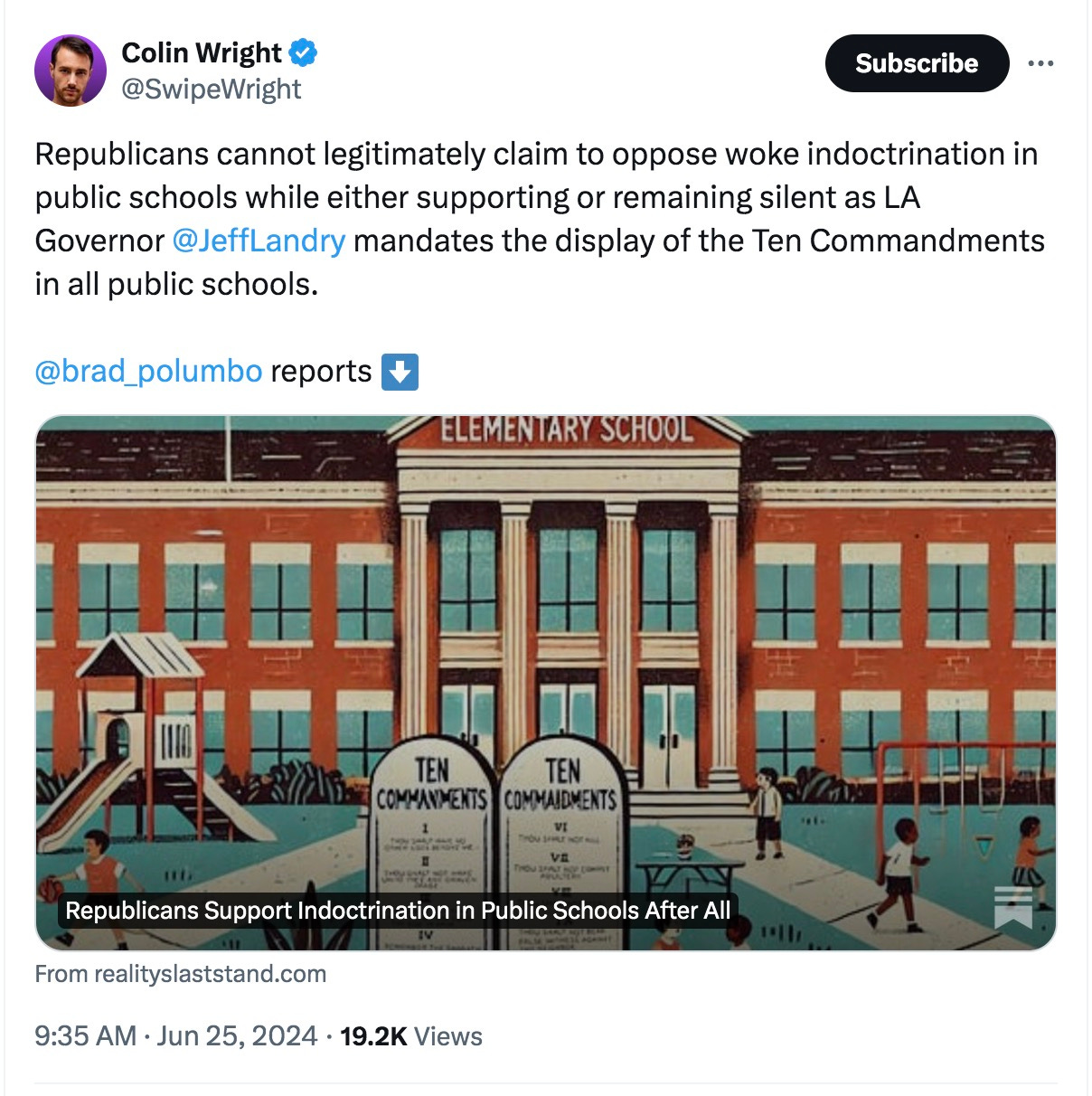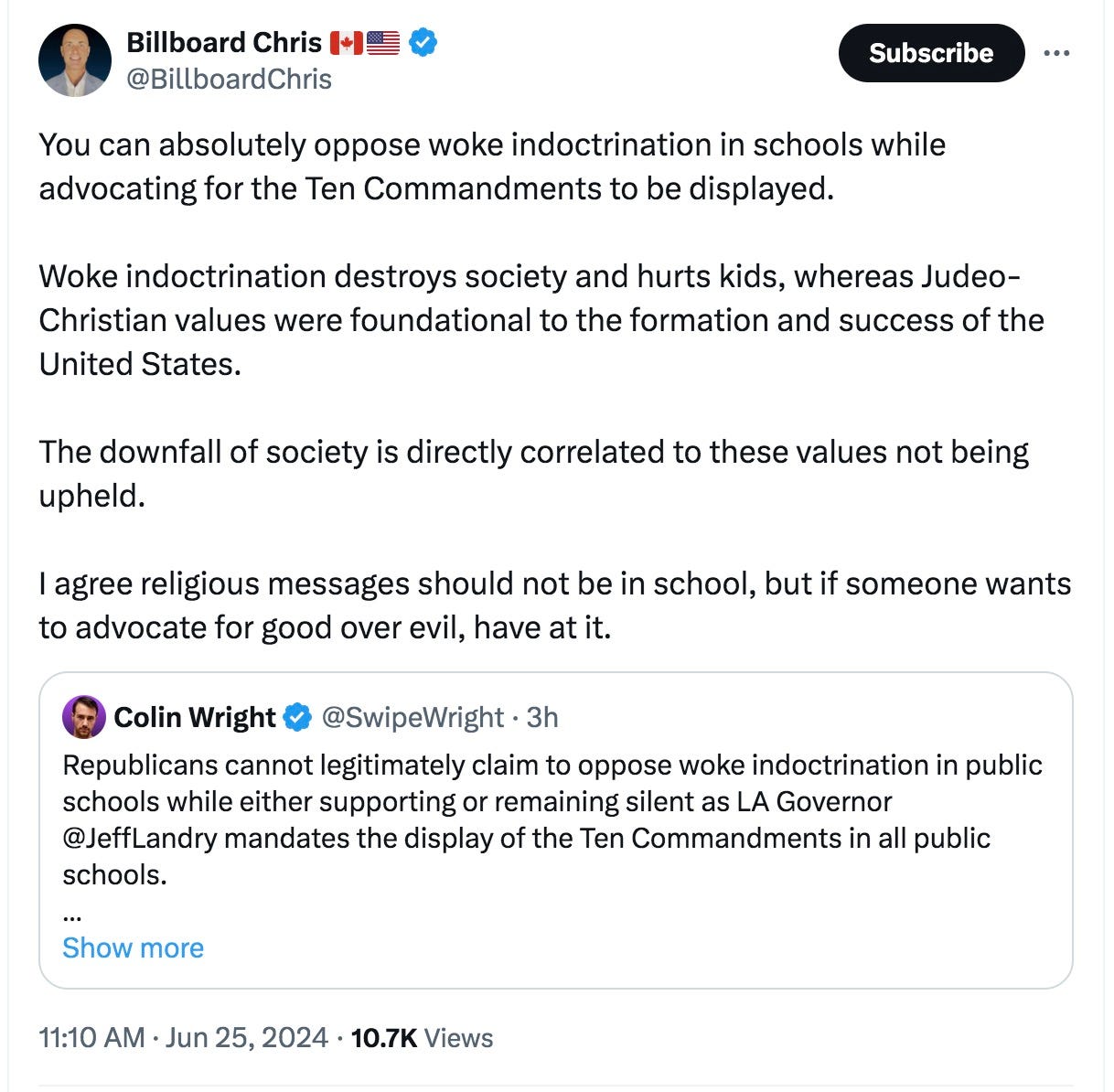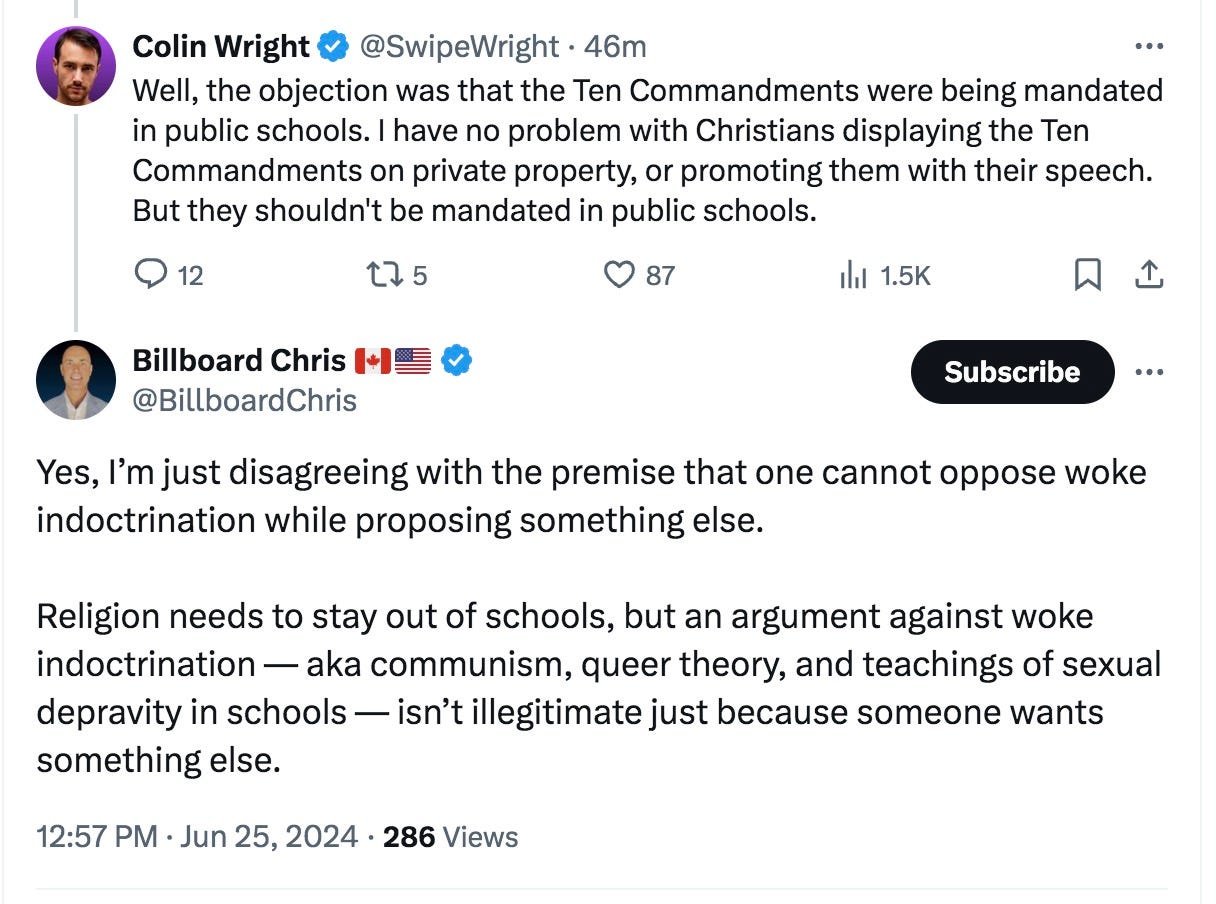E-Pluribus | June 25, 2024
Keeping confidential sources confidential; DEI's corrupting influence; and when is a crime not a crime?
A round-up of the latest and best musings on the rise of illiberalism in the public discourse:
Catherine Herridge: Protecting Sources Is a Hill Worth Dying On
There are times when journalists use “anonymous” sources simply because the source wishes to avoid natural consequences for speaking out, and the journalist doesn’t want to lose the story by refusing to keep names out of it. But in some cases, Catherine Herridge writes at The Free Press, keeping a source confidential is entirely justified and a society interested in a robust free press should protect the practice.
It is relatively uncommon for a court or the government to try to force a reporter to divulge sources. But it does happen, and when it does, it has a chilling effect on sources, reporters, and journalism itself. Sources wonder if they can trust a journalist who promises confidentiality, while journalists become less willing to offer that promise. It damages the ability of the press to root out wrongdoing.
There is some good news, though. Congress appears poised to make it far more difficult for journalists to be compelled to divulge their sources. In January, in a rare display of bipartisanship, the House unanimously passed the Protect Reporters from Exploitative State Spying Act, or the PRESS Act.
The bill, which is now awaiting action in the Senate, would mandate the disclosure of sources only in a limited number of cases, including imminent violence, such as terrorist threats. It would also bar the government from surveilling journalists via phone or electronic records. The Reporters Committee for Freedom of the Press and 53 news media organizations call it “. . . a reasonable, common-sense measure to preserve the free flow of information to the public.”
Indeed, a recent letter from a coalition of more than 130 civil liberties and journalism organizations, plus law professors and media lawyers, called the legislation “a rare chance to strengthen freedom of the press.” Led by Senators Ron Wyden (D-OR) and Mike Lee (R-UT), the bill is co-sponsored by Senate Judiciary Committee Chairman Dick Durbin (D-IL) and Ranking Member Lindsey Graham (R-SC). There is hope Durbin can advance the bill with the support of Graham and others before the end of the year. Senate Majority Leader Chuck Schumer is on record saying that he hopes to have the legislation on the president’s desk this year.
[. . .]
The protection of confidential sources is not about ego, and it doesn’t mean that journalists are somehow above the law. It’s about preserving the tools that shine a light on wrongdoing and hold government officials accountable. No whistleblower, no government insider with firsthand knowledge of corruption and misconduct will come forward without a promise their identity will be protected. In other words, without the promise of confidentiality, a reporter’s investigative toolbox is empty.
The litigation, and especially the contempt ruling, have taken a toll on me and my career. But I’ve come out the other side—bruised, but with a new sense of purpose and clarity. The First Amendment, the protection of confidential sources, and a free press are my guiding principles.
Read it all here.
Christopher F. Rufo: How DEI Corrupts America’s Universities
Even Christopher Rufo’s foes admit he’s been one of the most effective opponents of DEI ideology. At City Journal, Rufo uses material from the University of Colorado Boulder to show how DEI shapes every aspect of a student’s educational experience at the school.
Administrators, who are supposed to administer services and manage programs neutrally, use DEI ideology to impose political criteria on the speech and behavior of faculty, students, and staff. They subordinate the pursuit of truth, which should be a university’s highest commitment, to the dogmas of ideological activism.
To give an example of how DEI is actually practiced, consider the following training materials from University of Colorado Boulder’s DEI program.
The basic predicate of CU Boulder’s DEI program is that “Black, Indigenous and People of Color,” or “BIPOC,” students are failing because of “white supremacy culture.”
What is white supremacy culture? According to CU Boulder’s DEI documentation, it includes “individualism,” “perfectionism,” “a sense of urgency,” “worship of the written word,” and “objectivity.” These traits are supposedly vestiges of “whiteness” and unavailable to racial minorities—an unintentionally bigoted attitude.
Next, CU Boulder’s DEI bureaucrats would have you engage in a 21-day “Racial Equity Habit Building Challenge.”
One of the resources included in this program is a guide on “How to Be a Better White Person.” The document supplied a protocol on how to accomplish this task. Step one: “Realize you’re white.” Step two: “Recognize your privilege.” Step three: “Know things.” Finally, from a related resource, instructions on how to be an “ally” to racial minorities: “Transfer the benefits of your privilege to those who lack it”; “amplify the voices of the oppressed before your own”; “acknowledge that, even though you feel pain, the conversation is not about you.”
This is not the language of an academic program but of an abusive relationship.
Read it all.
Paul H. Robinson & Jeffrey Seaman: Stop Decriminalising Crime
Crime doesn’t pay, most of us were told growing up. But in a growing number of places these days, write Paul Robinson & Jeffrey Seaman at Quillette, criminals don’t pay for their crimes.
In San Francisco, a would-be thief stabs an elderly storeowner. In Philadelphia, a young black man bleeds out on the street. In California, an illegal immigrant released from jail goes on a killing spree. These three snapshots of tragedy share a common, preventable cause—progressive reforms that de facto decriminalised crime. America is increasingly suffering from under-criminalisation—a problem caused by reformers refusing to punish conduct the community views as criminal. The problem isn’t that some reformers want more lenient or rehabilitative punishment for crime, but rather that a progressive elite appears to be comfortable ignoring public views about what behaviour should be punished at all. Under-criminalisation isn’t just a democracy problem—it also contributes to America’s increasing crime rates and a sense of lawlessness that has made crime a top concern among voters. The solution is completely non-partisan: make sure the criminal law and its enforcement reflect community views—not those of an elite minority.
In order to stop under-criminalisation, we need to understand how it takes place in a democratic government. De facto decriminalisation policies can fail to represent community views even when they are enacted by referendums, legislation, or elected prosecutors. Consider California’s de facto decriminalisation of theft under $950 that resulted from Proposition 47—a referendum passed by 59 percent of California voters in November 2014. How could Proposition 47’s effect possibly be considered contrary to community views? The answer is that voters were not told what the consequences of the policy change would be.
[. . .]
[W]hen it comes to dereliction of duty, the third way that de facto decriminalisation occurs is the worst. Since 2015, a wave of progressive prosecutors have taken charge in some of America’s largest cities and unilaterally decided to stop enforcing the law against certain crimes. At least half of America’s largest prosecutorial districts, covering some 72 million Americans, are run by progressive prosecutors, who preside over cities such as Los Angeles, Seattle, Chicago, Philadelphia, and New York City. Such prosecutors typically promise voters to end over-punishment and reduce incarceration, while shifting resources away from minor crimes to tackle serious crime more effectively. Progressive prosecutors are also helped to power by only needing to win pluralities in small-turnout democratic primaries—a task made even simpler by large campaign contributions from progressive mega-donors.
[. . .]
Krasner’s approach is hardly unique among progressive prosecutors, and his de facto decriminalisation decisions should not be considered foolish mistakes but rather the spearhead of a progressive criminal-justice reform movement that ignores public views about what behaviour deserves punishment. Consider the widespread de facto decriminalisation of rioting in most of America’s major cities in 2020, where 90–95 percent of riot-related cases were dropped by progressive prosecutors. Despite the nationwide rioting costing up to $2 billion and leading to many deaths, progressive prosecutors across the country chose to ignore public demands that rioting be punished, instead choosing to sympathise with what Chicago’s DA Kim Foxx called the rioters’ “righteous anger.”
It is important to note that the problem with Krasner and other progressive prosecutors like him is not a desire on their part to impose more lenient punishments—it is their unilateral decision to impose no punishment on whole swaths of crime and criminals that the community sees as richly deserving punishment. A lenient punishment does far less damage to deterrence and the moral credibility of the law than a de facto decriminalisation where no punishment whatsoever is imposed and even the social stigma of a criminal conviction is lacking. Social-science studies and history have shown that when a gap opens between what the law punishes and what society believes should be punished, people lose respect for the law and become more likely to violate it.
Why do progressive prosecutors refuse to punish what their constituents see as crime? The simplest explanation is that progressive prosecutors see themselves as part of a moral minority, an enlightened vanguard cooking a beautiful omelette one cracked egg at a time. That beautiful omelette is a punishment-free society; the cracked eggs are the unfortunate crime victims of said society. To some progressive elites, punishment is itself the problem to be solved, and de facto decriminalising large swathes of crime is a powerful tool toward eliminating punishment.
Read the whole thing.
Around Twitter (X)
Colin Wright and “Billboard” Chris Elston spar over Louisiana’s new 10 Commandments display mandate for public schools:
Reactions to Julian Assange’s deal to avoid jail have been mixed, to say the least. Here, the Foundation for Individual Rights and Expression gives some background on what got Assange into trouble to begin with:
And finally, the woke crowd is really milking this:











